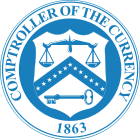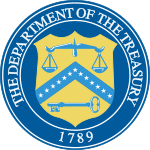- Office of the Comptroller of the Currency
-
Office of the Comptroller of the Currency 

Agency overview Formed February 25, 1863 Headquarters Washington, D.C. Employees 3104 (as of 2009) Agency executive John G. Walsh, Acting Comptroller of the Currency Parent agency Department of the Treasury Website www.occ.gov The Office of the Comptroller of the Currency (or OCC) is a US federal agency established by the National Currency Act of 1863 and serves to charter, regulate, and supervise all national banks and the federal branches and agencies of foreign banks in the United States. Currently, the acting Comptroller of the Currency is John Walsh.
Contents
Duties and functions
Headquartered in Washington, D.C., it has four district offices located in New York City, Chicago, Dallas and Denver. It has an additional 48 field offices throughout the United States, and a London office to supervise the international activities of national banks. It is an independent bureau of the United States Department of the Treasury and is headed by the Comptroller of the Currency. The OCC fulfills a number of main objectives:
- ensures the safety and soundness of the national banking system;
- fosters competition by allowing banks to offer new products and services;
- improves the efficiency and effectiveness of OCC supervision especially to reduce the regulatory burden;
- ensure fair and equal access to financial services to all Americans;
- enforces anti-money laundering and anti-terrorism finance laws that apply to national banks and federally-licensed branches and agencies of international banks; and
- is the agency responsible for investigating and prosecuting acts of misconduct committed by institution-affiliated parties of national banks, including officers, directors, employees, agents and independent contractors (including appraisers, attorneys and accountants).
The OCC participates in interagency activities in order to maintain the sanctity of the national banking system. By monitoring capital, asset quality, management, earnings, liquidity, sensitivity to market risk, information technology, consumer compliance, and community reinvestment, the OCC is able to determine whether or not the bank is operating safely and soundly, and meeting all regulatory requirements. The OCC was created by Abraham Lincoln to fund the American Civil War but was later transformed into a regulatory agency to instill confidence in the National Banking system and protect consumers from misleading business practices.
The OCC regulates and supervises about 1,500 national banks and 50 federal branches of foreign banks in the U.S., accounting for nearly two-thirds of the total assets of all U.S. commercial banks (as of June, 2010).
Other regulatory agencies like the OCC include: the Federal Deposit Insurance Corporation (of which the Comptroller serves as a director), the Federal Reserve, the Office of Thrift Supervision, and the National Credit Union Administration. The OCC routinely interacts and cooperates with other government agencies, including the Financial Crimes Enforcement Network, the Office of Foreign Asset Control, the Federal Bureau of Investigation, the Department of Justice, and the Department of Homeland Security.
The Comptroller also serves as a director of the Neighborhood Reinvestment Corporation, and the Federal Deposit Insurance Corporation.
Preemption of state banking regulation
In 2003, the OCC proposed regulations to preempt virtually all state banking and financial services laws for national banks and their diverse range of non-bank, corporate operating subsidiaries.[1] Despite opposition from the National Conference of State Legislatures,[2] the OCC's regulations went into effect. In Watters v. Wachovia Bank, N.A. in 2007 the United States Supreme Court validated the preemption of state regulations by the OCC, ruling that the OCC, not the states, has the authority to subject national banks to "general supervision" and "oversight":
...State regulators cannot interfere with the business of banking by subjecting national banks or their OCC-licensed operating subsidiaries to multiple audits and surveillance under rival oversight regimes.[3]
In Cuomo v. Clearing House Association, L. L. C., the Court clarified its decision in Watters, stating that federal banking regulations did not pre-empt the ability of states to enforce their own fair-lending laws, as "'general supervision and control' and 'oversight' are worlds apart from law enforcement," and therefore states retain law enforcement powers but have restricted "visitory" powers over national banks.[4]
HelpWithMyBank.gov
In July 2007, the OCC launched HelpWithMyBank.gov to assist customers of national banks and provide answers to national banking questions.[5]
List of Comptrollers of the Currency
- Hugh McCulloch - (1863-1865)
- Freeman Clarke - (1865-1866)
- Hiland R. Hulburd - (1867-1872)
- John Jay Knox - (1872-1884)
- Henry W. Cannon - (1884-1886)
- William L. Trenholm - (1886-1889)
- Edward S. Lacey - (1889-1892)
- A. Barton Hepburn - (1892–1893)
- James H. Eckels - (1893-1897)
- Charles G. Dawes - (1898–1901)
- William Barret Ridgely - (1901-1908)
- Lawrence O. Murray - (1908-1913)
- John Skelton Williams - (1914-1921)
- D. R. Crissinger - (1921–1923)
- Henry M. Dawes - (1923–1924)
- Joseph W. McIntosh - (1924–1928)
- John W. Pole - (1928–1932)
- J. F. T. O'Connor - (1933–1938)
- Preston Delano - (1938-1953)
- Ray M. Gidney - (1953–1961)
- James J. Saxon - (1961–1966)
- William B. Camp - (1966–1973)
- James E. Smith - (1973–1976)
- John G. Heimann - (1977–1981)
- Charles E. Lord - (acting comptroller for most of 1981) [6]
- C. T. Conover - (1981-1985)
- Robert L. Clarke - (1985–1992)
- Eugene Ludwig - (1993–1998)
- John D. Hawke, Jr. - (1998–2004)
- John C. Dugan - (2005 – 2010)
- John G. Walsh - (2010 - present)
See also
References
- ^ [1]
- ^ http://www.ncsl.org/standcomm/scfin/occ031006.htm
- ^ Watters v. Wachovia Bank, N.A., 550 U.S. 1 (Supreme Court of the United States 2007).
- ^ Cuomo v. Clearing House Association, L. L. C., 557 U.S. ___ (Supreme Court of the United States 2009).
- ^ Help and Frequently Asked Questions about National Banks from OCC's HelpWithMyBank.gov
- ^ http://query.nytimes.com/gst/fullpage.html?res=9F0CE2DE133EF930A25752C0A965958260
External links
- Official OCC site
- RSS Feed of OCC News and Information
- Acting Comptroller of the Currency John Walsh
- HelpWithMyBank.gov
- Annual Report of the Comptroller of the Currency
Bank regulation in the United States Federal authorities Federal Financial Institutions Examination Council • Federal Deposit Insurance Corporation • Federal Reserve Board • National Credit Union Administration • Office of the Comptroller of the Currency • Office of Thrift SupervisionMajor federal legislation
 (Category)Credit CARD Act of 2009 • Emergency Economic Stabilization Act of 2008 • Fair and Accurate Credit Transactions Act • Gramm–Leach–Bliley Act • Truth in Savings Act • Electronic Fund Transfer Act • Community Reinvestment Act • Home Mortgage Disclosure Act • Fair Credit Reporting Act • Truth in Lending Act • Bank Secrecy Act • Bank Holding Company Act • Federal Credit Union Act • Glass–Steagall Act • Federal Reserve Act
(Category)Credit CARD Act of 2009 • Emergency Economic Stabilization Act of 2008 • Fair and Accurate Credit Transactions Act • Gramm–Leach–Bliley Act • Truth in Savings Act • Electronic Fund Transfer Act • Community Reinvestment Act • Home Mortgage Disclosure Act • Fair Credit Reporting Act • Truth in Lending Act • Bank Secrecy Act • Bank Holding Company Act • Federal Credit Union Act • Glass–Steagall Act • Federal Reserve ActFederal Reserve Board
regulationsExtensions of Credit by Federal Reserve Banks (Reg A)
Equal Credit Opportunity (Reg B)
Home Mortgage Disclosure (Reg C)
Reserve Requirements for Depository Institutions (Reg D)
Electronic Fund Transfer (Reg E)
Limitations on Interbank Liabilities (Reg F)
International Banking Operations (Reg K)
Consumer Leasing (Reg M)
Loans to Insiders (Reg O)
Privacy of Consumer Financial Information (Reg P)
Prohibition Against the Paying of Interest on Demand Deposits (Reg Q)
Credit by Brokers and Dealers (Reg T)
Credit by Banks and Persons Other Than Brokers or Dealers for the Purpose of Purchasing or Carrying Margin Stock (Reg U)
Transactions Between Member Banks and Their Affiliates (Reg W)
Borrowers of Securities Credit (Reg X)
Truth in Lending (Reg Z)
Unfair or Deceptive Acts or Practices (Reg AA)
Community Reinvestment (Reg BB)
Availability of Funds and Collection of Checks (Reg CC)
Truth in Savings (Reg DD)Types of bank charter State authorities Terms Other topics Agencies under the United States Department of the Treasury Deputy Secretary
of the TreasuryAlcohol and Tobacco Tax and Trade Bureau · Community Development Financial Institutions Fund · Treasury Inspector General for Tax Administration · Internal Revenue Service · Office of the Comptroller of the Currency · Office of Thrift Supervision · Office of Tax Policy
Under Secretary
of the Treasury
for International AffairsOffice of East Asia · Office of South and Southeast Asia Nations · Office of Europe & Eurasia · Office of the Western Hemisphere · Office of International Monetary Policy · Office of Banking and Securities · Office of International Debt Policy · Office of Development Policy · Office of Financing Operations · Office of African Nations · Office of the Middle East & North Africa · Office of International Trade · Office of International Investment · Office of Trade Finance · Office of Technical Assistance · Office of Risk & Research Analysis · Exchange Stabilization FundUnder Secretary of
the Treasury for
Domestic FinanceAdvanced Counterfeit Deterrence · Bureau of the Public Debt · Federal Financing Bank · Financial Management Service · Office of Debt Management · Office of Financial Institutions · Office of Financial Markets · Office of Financial Stability · Office of Fiscal ServiceUnder Secretary of
the Treasury for Terrorism
and Financial IntelligenceTreasurer of the United States Categories:- Comptrollers in the United States
- United States Department of the Treasury agencies
- Financial regulatory authorities of the United States
- Organizations based in Washington, D.C.
- Government agencies established in 1863
Wikimedia Foundation. 2010.
